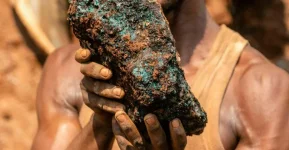Cobalt prices jumped up 27% last week because the Congo stopped sending it out of the country. The Democratic Republic of Congo decided nobody could export cobalt for four months. This big change scared companies that make electric car batteries and energy storage systems. The Benchmark Cobalt Price Assessment reported these numbers from Kinshasa on March 6.
The Congo makes more than 70% of all cobalt in the world. Its government paused exports because it wanted better control over its mines. It believes mining companies take advantage of it through bad contracts, lie about how much they dig up, and cheat on taxes. The country hopes these strict rules will bring more money back home for regular people.
Cobalt is crucial for making lithium-ion batteries that power electric vehicles from Tesla, Volkswagen, and BYD. Companies around the world depend on steady supplies to continue making cars, phones, and solar power systems. The Congo started caring more about who profits from its valuable rocks under the ground.
The country felt unhappy watching foreign businesses run away with minerals worth billions of dollars. Many mining deals happened years ago when the Congo had less power to negotiate fair terms. Officials think some companies hide true production numbers and avoid paying fair taxes. People also smuggle cobalt across borders, which costs the country huge amounts of money.
International groups pushed the Congo to clean up problems like children working in dangerous mines. These awful conditions made news headlines and embarrassed companies buying Congo cobalt. The government hopes stricter rules might force better behavior from mining businesses that want access to their valuable resources.
Markets reacted strongly because nobody prepared for such a major supplier to cut off exports suddenly. Prices will probably stay high or climb even higher until the ban ends in July 2025. Battery makers feel desperate to find new sources but face limited options. Indonesia, Australia, and Canada mine cobalt but produce much smaller amounts.
Chinese companies control many cobalt mines throughout the Congo. They process raw materials before shipping them to factories that make battery parts. The export ban interrupts this supply chain and might slow down electric vehicle production worldwide. Car prices could increase if manufacturers cannot find affordable replacement cobalt.
Experts believe the Congo might gain better mining deals through these tough actions. The country has enormous mineral wealth but remains among the poorest nations globally. Most citizens see little benefit from the treasures beneath their feet. The government gambles that temporary economic pain might lead to fairer treatment from international mining corporations that need their cobalt.
The Congo makes more than 70% of all cobalt in the world. Its government paused exports because it wanted better control over its mines. It believes mining companies take advantage of it through bad contracts, lie about how much they dig up, and cheat on taxes. The country hopes these strict rules will bring more money back home for regular people.
Cobalt is crucial for making lithium-ion batteries that power electric vehicles from Tesla, Volkswagen, and BYD. Companies around the world depend on steady supplies to continue making cars, phones, and solar power systems. The Congo started caring more about who profits from its valuable rocks under the ground.
The country felt unhappy watching foreign businesses run away with minerals worth billions of dollars. Many mining deals happened years ago when the Congo had less power to negotiate fair terms. Officials think some companies hide true production numbers and avoid paying fair taxes. People also smuggle cobalt across borders, which costs the country huge amounts of money.
International groups pushed the Congo to clean up problems like children working in dangerous mines. These awful conditions made news headlines and embarrassed companies buying Congo cobalt. The government hopes stricter rules might force better behavior from mining businesses that want access to their valuable resources.
Markets reacted strongly because nobody prepared for such a major supplier to cut off exports suddenly. Prices will probably stay high or climb even higher until the ban ends in July 2025. Battery makers feel desperate to find new sources but face limited options. Indonesia, Australia, and Canada mine cobalt but produce much smaller amounts.
Chinese companies control many cobalt mines throughout the Congo. They process raw materials before shipping them to factories that make battery parts. The export ban interrupts this supply chain and might slow down electric vehicle production worldwide. Car prices could increase if manufacturers cannot find affordable replacement cobalt.
Experts believe the Congo might gain better mining deals through these tough actions. The country has enormous mineral wealth but remains among the poorest nations globally. Most citizens see little benefit from the treasures beneath their feet. The government gambles that temporary economic pain might lead to fairer treatment from international mining corporations that need their cobalt.












